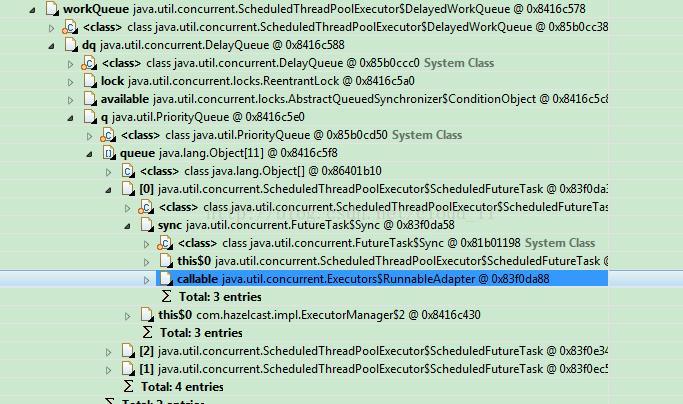实战Java内存泄漏问题分析 -- hazelcast2.0.3使用时内存泄漏 -- 2
第一种是在ConcuurentMapManager的构造函数中,通过调用node的executorManager中的ScheduledExecutorService来创建每秒执行一次cleanup操作的线程(代码如下)。由于这是ConcuurentMapManager构造函数的代码,所以这种调用startCleanup的操作是默认就会有的。
node.executorManager.getScheduledExecutorService().scheduleAtFixedRate(new Runnable() {
publicvoid run() {
for (CMap cMap : maps.values()) {
cMap.startCleanup(false);
}
}
}, 1, 1, TimeUnit.SECONDS);第二种是通过配置文件来触发startCleanup的执行,配置 PutOperationhandlerif overcapacity policy,我们系统的配置文件没有配置这方面的policy,所有这种方式在我们系统中没有使用。
第三种是自己直接写代码去调用startCleanup函数(public方法,线程安全的). 这个没有实现在我们的系统中。
所以我的调查方向放在了第一种调用的情况,hazelcast里面的ScheduledExecutorService是通过java.util.ScheduledThreadPoolExecutor 来实现的.
esScheduled = new ScheduledThreadPoolExecutor(5, new ExecutorThreadFactory(node.threadGroup,
node.getThreadPoolNamePrefix("scheduled"), classLoader), new RejectionHandler()) {
protected void beforeExecute(Thread t, Runnable r) {
threadPoolBeforeExecute(t, r);
}
} public ScheduledFuture scheduleAtFixedRate(Runnable command,
long initialDelay,
long period,
TimeUnit unit) {
if (command == null || unit == null)
throw new NullPointerException();
if (period <= 0)
throw new IllegalArgumentException();
RunnableScheduledFuture t = decorateTask(command,
new ScheduledFutureTaskScheduleFutureTask的run方法实现重新schedule:
public void run() {
boolean periodic = isPeriodic();
if (!canRunInCurrentRunState(periodic))
cancel(false);
else if (!periodic)
ScheduledFutureTask.super.run();
else if (ScheduledFutureTask.super.runAndReset()) {
setNextRunTime();
reExecutePeriodic(outerTask);
}
}private void delayedExecute(Runnable command) {
if (isShutdown()) {
reject(command);
return;
}
// Prestart a thread if necessary. We cannot prestart it
// running the task because the task (probably) shouldn't be
// run yet, so thread will just idle until delay elapses.
if (getPoolSize() < getCorePoolSize())
prestartCoreThread();
super.getQueue().add(command);
}
public boolean prestartCoreThread() {
return addIfUnderCorePoolSize(null);
}
private boolean addIfUnderCorePoolSize(Runnable firstTask) {
Thread t = null;
final ReentrantLock mainLock = this.mainLock;
mainLock.lock();
try {
if (poolSize < corePoolSize && runState == RUNNING)
t = addThread(firstTask);
} finally {
mainLock.unlock();
}
return t != null;
}
private Thread addThread(Runnable firstTask) {
Worker w = new Worker(firstTask);
Thread t = threadFactory.newThread(w);
boolean workerStarted = false;
if (t != null) {
if (t.isAlive()) // precheck that t is startable
throw new IllegalThreadStateException();
w.thread = t;
workers.add(w);
int nt = ++poolSize;
if (nt > largestPoolSize)
largestPoolSize = nt;
try {
t.start();
workerStarted = true;
}
finally {
if (!workerStarted)
workers.remove(w);
}
}
return t;
} try {
hasRun = true;
Runnable task = firstTask;
firstTask = null;
while (task != null || (task = getTask()) != null) {
runTask(task);
task = null;
}
} finally {
workerDone(this);
}
}
}
Runnable getTask() {
for (;;) {
try {
int state = runState;
if (state > SHUTDOWN)
return null;
Runnable r;
if (state == SHUTDOWN) // Help drain queue
r = workQueue.poll();
else if (poolSize > corePoolSize || allowCoreThreadTimeOut)
r = workQueue.poll(keepAliveTime, TimeUnit.NANOSECONDS);
else
r = workQueue.take();
if (r != null)
return r;
if (workerCanExit()) {
if (runState >= SHUTDOWN) // Wake up others
interruptIdleWorkers();
return null;
}
// Else retry
} catch (InterruptedException ie) {
// On interruption, re-check runState
}
}
}
private void runTask(Runnable task) {
final ReentrantLock runLock = this.runLock;
runLock.lock();
try {
if ((runState >= STOP ||
(Thread.interrupted() && runState >= STOP)) &&
hasRun)
thread.interrupt();
boolean ran = false;
beforeExecute(thread, task);
try {
task.run();
ran = true;
afterExecute(task, null);
++completedTasks;
} catch (RuntimeException ex) {
if (!ran)
afterExecute(task, ex);
throw ex;
}
} finally {
runLock.unlock();
}
}1. ScheduledThreadPoolExecutor初始化时候出错,task完全没有提交成功。由于lastCleanup并不是系统应用的启动时间,已经过了几个月了,所以,很明显在系统初始化的时候,esScheduled(ScheduledThreadPoolExecutor)还是正常工作的,只是突然在2月4号停止了工作,所以这种可能性可以排除。
2. Worker 没有正常工作,不在从ScheduledThreadPoolExecutor的queue里面取数据,这个很快就被我排除了:
首先heap dump中有5个pending workers in esScheduled (0/2/3/5/9):
其次从thread dump中可以看出,这五个线程都是在等着从queue里面取数据:
……
at java/util/concurrent/locks/AbstractQueuedSynchronizer$ConditionObject.awaitNanos(AbstractQueuedSynchronizer.java:2025)[optimized]
at java/util/concurrent/DelayQueue.take(DelayQueue.java:164)[optimized]
at java/util/concurrent/ScheduledThreadPoolExecutor$DelayedWorkQueue.take(ScheduledThreadPoolExecutor.java:609)[inlined]
at java/util/concurrent/ScheduledThreadPoolExecutor$DelayedWorkQueue.take(ScheduledThreadPoolExecutor.java:602)[optimized]
at java/util/concurrent/ThreadPoolExecutor.getTask(ThreadPoolExecutor.java:947)[optimized]
at java/util/concurrent/ThreadPoolExecutor$Worker.run(ThreadPoolExecutor.java:907)
at java/lang/Thread.run(Thread.java:662)
at jrockit/vm/RNI.c2java(JJJJJ)V(Native Method)
-- end of trace
hz._hzInstance_1_com.ericsson.ngin.session.ra.hazelcast.scheduled.thread-2" id=51 idx=0xd8 tid=32639 prio=5 alive, parked, native_blocked
hz._hzInstance_1_com.ericsson.ngin.session.ra.hazelcast.scheduled.thread-3" id=52 idx=0xdc tid=32640 prio=5 alive, parked, native_blocked
hz._hzInstance_1_com.ericsson.ngin.session.ra.hazelcast.scheduled.thread-4" id=53 idx=0xe0 tid=32641 prio=5 alive, parked, native_blocked
hz._hzInstance_1_com.ericsson.ngin.session.ra.hazelcast.scheduled.thread-5" id=75590 idx=0x3cc tid=3308 prio=5 alive, parked, native_blocked
3. 我们提交给系统的runner task自动从queue里面消失了,从memory dump中确实发现queue没有tasks了
而没有task的原因很明显是因为当前task执行完之后没有重新reschedule,至于原因,由于scheduledFutrueTask已经不存在,无法从memory dump和thread dump中分析出结果,成为了一个谜。。。。。。
public void run() {
boolean periodic = isPeriodic();
if (!canRunInCurrentRunState(periodic))
cancel(false);
else if (!periodic)
ScheduledFutureTask.super.run();
else if (ScheduledFutureTask.super.runAndReset()) {
setNextRunTime();
reExecutePeriodic(outerTask);
}
}